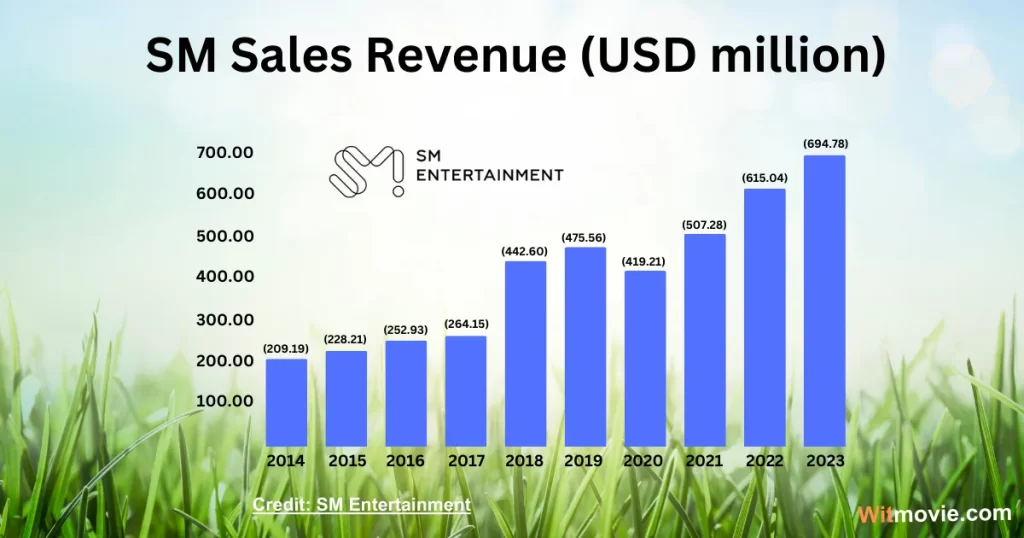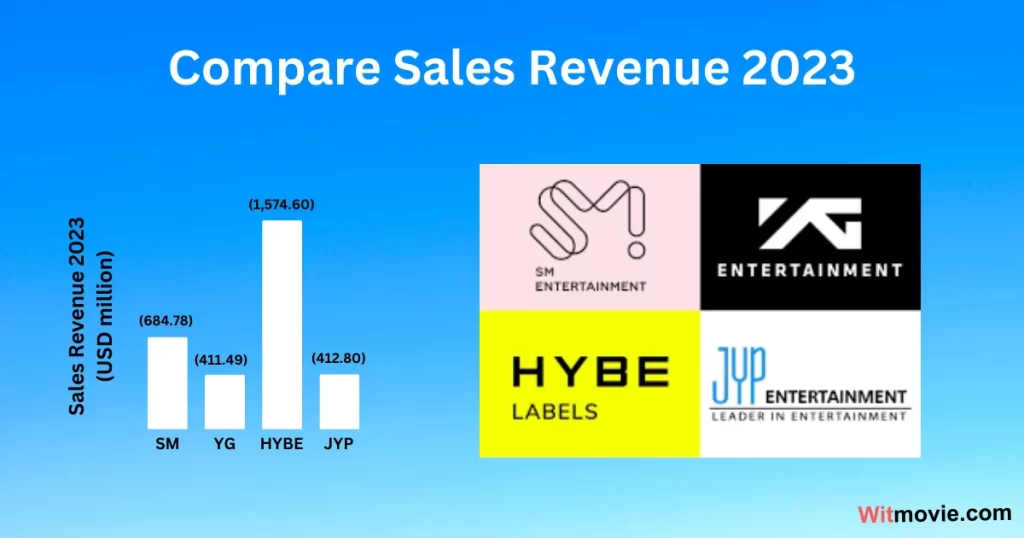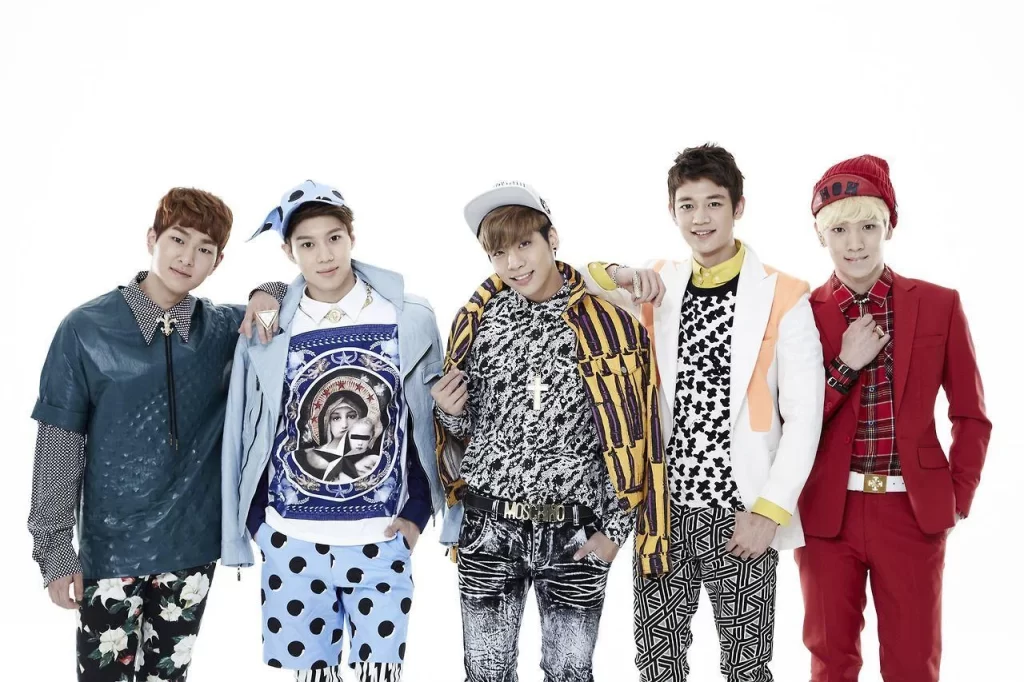SM Entertainment, established in 1995 by Sooman Lee, is one of South Korea’s leading entertainment companies. The agency has been instrumental in the success of many prominent K pop groups and solo artists, including Super Junior, Girls’ Generation, SHINee, EXO, and NCT.
With its diverse roster of artists, SM Entertainment has consistently produced chart-topping hits and groundbreaking performances. The company operates as a record label, talent agency, and music production company, making it a multifaceted powerhouse.
Recently, they launched the SM Classics label, releasing debut singles like Johann Kim’s “Hummingbird.” This move showcases its expansion into various music genres and markets.
SM Entertainment is not just about music; it has deeply influenced fashion, dance, and global pop culture. The company’s strategic moves, such as partnerships and acquisitions, continue to shape its competitive edge.
For instance, HYBE’s recent investment in SM Entertainment illustrates its dynamic presence in the industry, ensuring it remains at the forefront of entertainment innovation.
History and Growth of SM Entertainment
SM Entertainment has grown from a local Korean company to a global entertainment powerhouse. This journey includes its foundation by Sooman Lee in 1995 in Seoul, South Korea, and the company’s key milestones in establishing a significant presence in the entertainment industry.
Foundation and Expansion
Initially, the company aimed to develop and promote K pop artists. With Sooman Lee’s vision, they created a streamlined system that trained and debuted new talents.
During the early years, SM Entertainment focused on nurturing talent through rigorous training programs. Their first major success came with the debut of H.O.T., a boy band that took the Korean music scene by storm in 1996. Other popular acts like S.E.S. and Shinhwa followed this success.
SM Entertainment expanded its reach globally as the internet and social media grew. They established partnerships and opened international branches to tap into markets like China, Japan, and the United States.
This strategic expansion turned SM Entertainment into a global brand, making K pop a worldwide phenomenon.
Significant Milestones
Over the years, SM Entertainment achieved several significant milestones. One of the most notable was the acquisition of KOSDAQ-listed company BT&I, which they renamed S.M. Culture & Contents. This move helped them establish a strong foothold in visual media production and actor management, becoming one of the largest in Asia.
In addition, SM Entertainment launched the sub-label SM Classics, focusing on classical music to diversify their offerings. This allowed them to attract different audiences and artists, further solidifying their place in the global entertainment market.
Another critical milestone was their use of innovative technology. They leveraged advanced production techniques and virtual reality to enhance their music and performance quality.
This innovation kept them at the forefront of the entertainment industry, appealing to tech-savvy fans worldwide.
SM Entertainment’s Roster
SM Entertainment, a leading South Korean entertainment company, boasts an extensive roster that includes K pop groups, solo artists, subunits, actors, and other entertainers. This diverse lineup has significantly contributed to its global acclaim.
Prominent Groups
SM Entertainment is known for housing several of the biggest K-pop groups. BoA is one of the pioneering artists who brought international fame to the company. After success, Super Junior became famous for their hit songs and diverse talents. Girls’ Generation is another cornerstone, often called the “Nation’s Girl Group.”
SHINee and EXO have expanded the company’s influence with their unique styles and widespread popularity.
Recently, groups like Red Velvet and NCT have continued the legacy with fresh concepts and innovative music. aespa, the newest addition, has quickly garnered attention for their distinct virtual reality concept and catchy music.
Solo Artists and Subunits
SM Entertainment has also nurtured the talents of several solo artists and formed successful subunits. Taeyeon from Girls’ Generation and Baekhyun from EXO are notable solo artists who have released multiple chart-topping albums. Another significant solo artist is BoA, one of K pop’s most influential figures.
Subunits like Super Junior-D&E (Donghae & Eunhyuk) and EXO-CBX (Chen, Baekhyun, and Xiumin) offer fans specialized content distinct from their primary groups.
Meanwhile, Red Velvet‘s subunit, Irene & Seulgi, also provides a different flavor than the full group.
Actors and Entertainers
Apart from music, SM Entertainment has a roster of talented actors and entertainers. These individuals often transition between music and acting, showcasing their versatility.
For example, Siwon from Super Junior and Yoona from Girls’ Generation have had successful acting careers, appearing in popular dramas and films.
D.O. from EXO has also earned critical acclaim for his acting roles. Additionally, the company manages TV presenters, models, and other entertainers, adding to the diversity of their talent pool.
Business Operations and Divisions
SM Entertainment operates various business ventures, including music production and talent management. Numerous subsidiaries and affiliates support its broad influence in entertainment.
Record Label and Production
SM Entertainment is renowned for producing and managing some of the biggest names in K pop. Under its record label, it operates various activities, including music production, talent development, and content creation.
List of Record Labels and Production:
| Division/Label | Description |
|---|---|
| SM Entertainment | Main label overseeing all artist management and production. |
| SM Studio | Handles high-quality music production and artist development. |
| SM Town | Collective branding for all SM artists and collaborative projects. |
| ScreaM Records | Specializes in electronic dance music (EDM) production and distribution. |
| SM Classics | Focuses on classical music production and artist management. |
| SM Station | Digital music project releasing weekly singles from various artists. |
| Label SJ | Dedicated label for Super Junior’s activities and productions. |
| Million Market | Subsidiary label managing a diverse roster of artists and producers. |
| All I Know Music | Subsidiary label focusing on hip-hop and R&B genres. |
| WAVY | Subsidiary label managing Chinese artists and productions. |
These efforts ensure a diverse musical output and maintain SM Entertainment’s status as a premier music production company.
Subsidiaries and Affiliates
SM Entertainment has various subsidiaries and affiliates that contribute to its expansive operations. These subsidiaries allow for diversification and specialized focus in different entertainment sectors.
List of Subsidiary and Affiliate:
| Subsidiary/Affiliate | Description |
|---|---|
| SM Culture & Contents | Engages in the production and distribution of content. |
| SM Life Design Group | Focuses on lifestyle and design-related businesses. |
| SM Entertainment Japan | Manages SM artists’ activities and promotions in Japan. |
| SM Academy | Provides training and education for aspiring entertainers. |
| SM Art Company | Specializes in theatrical and musical productions. |
| SM Pictures | Produces and invests in films and television dramas. |
| SM Amusement | Operates entertainment facilities and services. |
| SM F&B Development | Manages food and beverage businesses. |
| Dream Maker Entertainment | Organizes concerts and events. |
| Stream Media Corporation | Manages digital content and media platforms. |
| KEYEAST | Engages in talent management and production. |
| Mystic Story | Focuses on music production and artist management. |
| Dear U | Develops and operates fan communication platforms. |
| SM Brand Marketing | Manages branding and marketing initiatives. |
| ScreaM Records | Specializes in electronic dance music (EDM) production |
| SM True | SM Entertainment’s business operations in Thailand. |
| SM USA | Manages SM artists’ activities in the United States. |
| SM Entertainment Beijing | Oversees SM Entertainment’s operations in China. |
| SM Mobile Communications | Develop mobile platforms to enhance the company’s and its artists’ digital presence. |
Innovation in Entertainment
SM Entertainment has consistently pushed the boundaries of the entertainment industry. Their efforts are evident in concepts like the SM Culture Universe and their focus on next-generation projects.
SM Culture Universe
SM Entertainment introduced the SM Culture Universe (SMCU) to provide a unique narrative backdrop for their artists. This universe includes an interconnected storyline for their acts, enhancing the fan experience.
For instance, EXO’s superpower concept is a part of this universe, creating a rich lore that fans can explore.
Through the SMCU, SM Entertainment is not just a production studio but a content creator, offering story-driven experiences. This approach merges music, videos, and virtual events to maintain engagement.
SMCU represents a modern way of holding fan interest and driving innovation for entertainment agencies.
Next-Generation Projects
SM Entertainment is pioneering new technologies and formats in the entertainment sector. It invests in next-generation projects like virtual concerts and AI-driven performances.
These innovations help them stay relevant and offer fans new ways to enjoy music and interact with their favorite artists.
Projects like virtual reality concerts and AI-based artist development show how they leverage technology. SM’s systematic production systems and long-term investment models have allowed it to champion initiatives that few in the industry have attempted, uniting legacy techniques with cutting-edge advancements.
Marketing and Promotions
SM Entertainment employs a multifaceted approach to marketing and promotions, leveraging social media platforms and strategic brand partnerships to reach a global audience. The company’s innovative tactics keep its artists at the forefront of the entertainment industry.
Use of Social Media
Social media is a key tool for SM Entertainment’s marketing strategies. The company extensively uses platforms like YouTube, Instagram, Twitter, Facebook, and websites to promote its artists.
By uploading content like music videos, behind-the-scenes clips, and live streams, they engage fans and build anticipation for new releases.
- YouTube: SM Entertainment effectively utilizes YouTube to share mini-music videos and track videos. These visual elements enhance the listening experience and attract viewers globally.
- Twitter and Websites: Continuous updates and interactions on Twitter and official websites help maintain a strong connection with fans, providing real-time information and exclusive content.
These platforms enable SM Entertainment to efficiently reach broad and diverse audiences, making them crucial in promotional activities.
Brand Partnerships and Endorsements
SM Entertainment also excels in securing brand partnerships and endorsements, significantly boosting its marketing reach.
Collaborations with well-known brands promote the artists and create an additional revenue stream for the company.
- Strategic Partnerships: SM Entertainment frequently partners with brands to create exclusive content and promotions. For instance, their collaboration with Kakao Entertainment enhances their presence in the digital space.
- Endorsements: Artists under SM Entertainment often serve as ambassadors for prominent brands, elevating the brand’s and the artist’s visibility. These endorsements range from fashion brands to technology companies, showcasing the versatility and influence of SM artists.
Financial Performance

SM Entertainment has achieved significant financial milestones, particularly in revenue growth and investments. Their financial success is evident across various regions, including Japan and the USA.
Revenue
SM Entertainment has experienced impressive revenue growth in recent years. Notably, they reported consolidated sales of USD 694.78 million in 2023, indicating strong performance. This growth was driven by multiple factors, including successful album sales and concert tours.
Their record-breaking quarter reflected a remarkable 70% year-over-year increase in consolidated operating profit, reaching USD 36.5 million. Moreover, revenue rose by 12% year-over-year to USD 19.3 million. These figures highlight the company’s effective strategies in leveraging its brand and talent.
Investment and Stocks
Investments have played a crucial role in SM Entertainment’s growth. The company actively invests in emerging talents and new markets. For instance, expanding its presence through SM Entertainment Japan and SM Entertainment USA opens up broader revenue generation and brand expansion avenues.
Additionally, SM Entertainment’s stocks have shown positive performance. The solid financial results have boosted investor confidence, leading to higher stock valuations. These moves have fortified the company’s market position and overall financial health.
Training and Development
SM Entertainment has a robust training and development system designed to create top-tier artists in the K-pop industry. This system covers all aspects of preparation, from vocational training to continuous artist growth.
SM Training System
SM Entertainment established a systematic approach to training aspiring artists. This method includes rigorous castings, vocal lessons, dance training, and more. The company even launched the SM Universe Academy, which offers specialized majors like producing, vocal, dance, modeling, and acting.
Training at SM Entertainment typically begins with auditions. Selected trainees undergo intensive programs focusing on the following:
- Vocal Training: Enhancing singing skills with professional instructors.
- Dance: Learning complex choreographies and building stamina.
- Language: Mastering Korean, English, and Japanese for global appeal.
This comprehensive setup ensures that trainees are well-prepared for the entertainment industry.
Artist Growth
Once trainees debut, the focus shifts to continuous development. SM Entertainment provides ongoing support for their artists, helping them grow and adapt within the fast-paced world of K-pop.
Support measures include:
- Regular Assessments: Evaluating performance and identifying areas for improvement.
- Personal Development: Offering classes in acting, public speaking, and other relevant fields.
- Health and Wellness: Ensuring artists maintain physical and mental health through proper care and counseling.
SM Town ensures that their artists debut successfully and sustain and grow their careers in the industry.
SM Audition
SM Entertainment’s audition process is well-known for discovering talented individuals who aspire to be stars. The company accepts profiles submitted via email, including video or music files and photos. This method allows talents worldwide to showcase their skills without attending physical auditions.
The 2023 SM Global Audition is a significant event where hopefuls can audition in various categories like singing, dancing, acting, and modeling. This global search aims to find the freshest and most promising talents for SM Entertainment’s future projects.
A recent highlight is the launch of the SM NEW GIRL GROUP AUDITION in 2024. This initiative marks the company’s first global search for new girl group members, reflecting SM’s commitment to nurturing fresh talent.
By providing diverse platforms and opportunities, SM Entertainment ensures that a wide range of talent is nurtured and promoted within their various labels and subsidiaries. This approach allows discovering and developing unique artists to contribute to the global entertainment landscape.
Live Events and Concerts

SM Entertainment excels in organizing live events and concerts that captivate global audiences with spectacular performances. Their shows are famed for their impressive lineups and breathtaking productions, bringing the excitement of K pop to fans worldwide.
Global Tours
SM Entertainment’s artists frequently embark on global tours, bringing K pop to international stages. These tours often feature well-known groups such as EXO, NCT, and aespa. They cover multiple countries across Asia, Europe, and the Americas. This helps the company nurture a large global fanbase and introduce K-pop to new audiences.
Notable tours include the “2024 aespa LIVE TOUR—SYNK: PARALLEL LINE,” which will take place in June at venues including Seoul’s Jamsil Indoor Stadium. Fans eagerly anticipate these tours as they offer a chance to see their favorite idols perform live and interact with international fans.
Special Events
In addition to global tours, SM Entertainment hosts special events like the annual SMTOWN LIVE. These events are prestigious and draw massive crowds. The upcoming SMTOWN Live 2024: SMCU Palace in Tokyo is scheduled for February 21-22 at Tokyo Dome.
This star-studded concert, marking the 20th installment of the show, includes acts like TVXQ and RIIZE. The event also features a livestream option for global fans, further extending its reach and ensuring fans who cannot attend in person can still enjoy the performances.
Legal Challenges and Controversies
SM Entertainment has faced various legal issues that have impacted its reputation and operations. These challenges include contractual disputes and public relations problems involving its artists and the broader entertainment industry in Korea.
Contractual Disputes
SM Entertainment has been involved in several contractual disputes concerning the company’s control and management. A significant case involves SM co-CEO Sungsu Lee, who has accused founder Sooman Lee of mismanagement and unfairly benefiting from the company. This battle for control has raised questions about governance and transparency within the organization.
Additionally, SM Entertainment has faced criticism for allegedly failing to fulfill financial arrangements, including the construction costs for SMTown LA, which began in 2019. These unpaid costs have led to further legal action and scrutiny.
Public Relations Issues
SM Entertainment has also had to manage various public relations issues. Artists under SM frequently confront malicious rumors and online attacks, which affect their public image. The company has announced solid legal measures against these attacks, emphasizing zero tolerance for such criminal acts.
Besides, in April 2024, SM Entertainment reiterated its stance, expressing intent to pursue legal action against false rumors targeting artists like BoA, Heechul Kim, and NCT members. These ongoing battles illustrate companies’ broader challenges in maintaining a positive image within the competitive K pop industry.
Industry Influence and Competition

SM Entertainment has played a crucial role in the globalization of K-pop, significantly shaping the industry. However, it faces intense competition from other major agencies, including HYBE, YG Entertainment, and JYP Entertainment.
Role in K pop Globalization
SM Entertainment has been a pioneer in spreading K pop beyond South Korea. Founded by Lee Soo-man, the company produced H.O.T., one of the first K-pop groups to gain international success in the 1990s. This paved the way for future talent and set a standard in the industry.
Their innovative production techniques and global marketing strategies have helped create numerous iconic K pop acts. Groups such as Girls’ Generation, EXO, and NCT have achieved significant global popularity. Each group’s success has bolstered SM’s reputation as a leader in K-pop globalization.
Additionally, SM Entertainment has invested in global auditions and overseas concerts. These strategies have attracted international fans and increased worldwide attention to K pop. Their partnerships with international record labels have also expanded their reach.
Competitive Landscape
Major players like HYBE, YG Entertainment, and JYP Entertainment have challenged SM Entertainment’s dominance. HYBE, formerly Big Hit Entertainment, gained prominence with BTS‘s global success. This success has thrust HYBE into the spotlight, making it a formidable competitor.
YG Entertainment, known for groups like BLACKPINK and Big Bang, has also been a significant player. Their unique musical style and strong visual identity have garnered a broad fanbase.
JYP Entertainment, with acts like TWICE and Stray Kids, has maintained a solid presence. Their focus on talent development and strategic marketing has kept them competitive.
The industry is marked by strategic alliances and mergers. For instance, HYBE’s recent attempt to acquire a significant stake in SM highlights the market’s competitive nature.
What Group is Under SM Entertainment?
SM Entertainment is renowned for successfully managing several popular K pop groups. Here are some of the most notable groups under their label:
Here is a table summarizing the information:
| Group | Debut Year | Notable Songs | Additional Information |
|---|---|---|---|
| Super Junior | 2005 | “Sorry, Sorry“ | Large international fanbase |
| Girls’ Generation | 2007 | “Gee“, “I Got a Boy“ | Widely popular |
| SHINee | 2008 | Known for unique music style and fashion concepts | |
| EXO | 2012 | “Growl“, “Call Me Baby“ | Quickly rose to fame |
| Red Velvet | 2014 | Versatile music and concepts | |
| NCT | 2016 | Known for multiple sub-units like NCT 127, NCT Dream, and WayV | |
| aespa | 2020 | “Black Mamba“, “Next Level“ | Gained significant attention |
| RIIZE | Recent | Fresh sound and style | Newest addition to SM Entertainment |
In addition to these well-known idol groups, SM Entertainment manages various solo artists and non-idol groups, showcasing their broad influence in the music industry.
Who All Left SM Entertainment?
SM Entertainment has seen many notable idols part ways with the company. These departures often generate significant attention. Below are some of the prominent idols who have left SM Entertainment and their current pursuits:
| Name | Group Affiliation | Departure Year | Reason for Leaving | Current Activities |
|---|---|---|---|---|
| Kris Wu | EXO | 2014 | Health and financial reasons | Singer, model, and actor in China |
| Taemin | SHINee | 2024 | Speculated to join BPM Entertainment | Future activities unknown |
| Jessica Jung | Girls’ Generation | 2014 | To focus on her fashion brand and solo activities | Fashion brand owner and solo artist |
| Luhan | EXO | 2014 | To pursue a career in China | Leading figure in the Chinese entertainment industry |
| Huang Zitao (Tao) | EXO | 2015 | To pursue solo activities in China | Singer, actor, and TV host in China |
These departures often come with controversies, lawsuits, or new career beginnings. Many former SM idols continue to thrive in new environments, proving their adaptability and wide-ranging talents.
What is the biggest entertainment company in Korea?
Several key players come to mind when discussing the largest entertainment company in Korea. These companies have greatly influenced the K pop industry.
SM Entertainment is one of these major establishments. It was founded in 1995 by Lee Soo-man. SM has developed famous artists like BoA, TVXQ, and EXO. The company is recognized for its success and expansion beyond Asia.
Another big name is YG Entertainment, which was established in 1996 by Yang Hyun-suk. YG has been behind the launch of groups like BIGBANG, BLACKPINK, and 2NE1. Despite controversies, YG remains a dominant force.
JYP Entertainment also ranks among the top. Founded by J.Y. Park in 1997, JYP has produced popular acts such as TWICE, GOT7, and Stray Kids. The company’s training system and global reach significantly contribute to its status.
HYBE Corporation, formerly Big Hit Entertainment, is another giant. Known for managing BTS, HYBE’s influence in K-pop is undeniable. BTS’s unprecedented global success has propelled HYBE to the forefront of the industry.
Each of these companies has a distinctive approach:
- SM Entertainment: Focuses on comprehensive artist development.
- YG Entertainment: Emphasis on originality and creative freedom.
- JYP Entertainment: Known for its rigorous training and talent discovery.
- HYBE Corporation: Leveraging digital platforms and innovation.
These companies are the foundation of Korea’s entertainment industry, shaping it into the global phenomenon that K pop is today.
Who is the Youngest SM Artist?

The youngest artist currently under SM Entertainment is Ningning, a member of the popular girl group aespa.
Ningning, whose full name is Ning Yizhuo, was born on October 23, 2002. She debuted with aespa on November 17, 2020, making her the group’s youngest member, or “maknae.”
Key Details about Ningning:
| Attribute | Details |
|---|---|
| Name | Ning Yizhuo |
| Stage Name | Ningning |
| Birthdate | October 23, 2002 |
| Debut Date | November 17, 2020 |
| Role in Group | Main Vocalist, Maknae |
Ningning’s youthful energy and powerful vocals have earned her significant attention. Her talent and charm contributed to aespa’s rising fame in the K-pop industry.
Among the artists listed under SM Entertainment, Ningning stands out for her age and impressive skills. Her role as the main vocalist brings a unique sound to the group, highlighting her early achievements and promising future in the entertainment industry.
Who Is the Youngest K pop Idol?

Jisung from NCT, a group under SM Entertainment, is the youngest male idol from the Big 4 agencies. He was born on February 5, 2002, and debuted at just 14 years old. This makes JiSung one of the most notable young idols in the industry.
Youngest K-Pop Idols from Big 4 Agencies
Here is a list of some of the youngest idols from other major agencies:
| Entertainment Company | Idol Name | Group | Birthdate | Debut Age |
|---|---|---|---|---|
| HYBE | Ni-ki | ENHYPEN | Dec 9, 2005 | 14 |
| YG Entertainment | Junghwan | TREASURE | Feb 18, 2005 | 15 |
| JYP Entertainment | Yuna | ITZY | Dec 9, 2003 | 15 |
| HYBE | Eunchae | LE SSERAFIM | Nov 10, 2006 | 15 |
These idols often start their training at a very young age, which requires a significant commitment and passion for their craft. As they grow older, their skills and stage presence evolve, but their early days remain a testament to their dedication.
How Old is the Oldest K pop Idol?

The oldest K pop idol is Joon Park, also known as Joon or sometimes by his Korean name, Park Joon Hyung. Born in 1969, he debuted as the leader and rapper of the group g.o.d in 1999.
Despite debuting later in life compared to most idols, Joon Park remains active in the industry.
Here are some important points about Joon Park:
- Debut Year: 1999
- Group: g.o.d
- Role: Leader and Rapper
- Year of Birth: 1969
Joon Park’s longevity in the industry is quite impressive, as many K pop idols debut in their teens or early twenties.
It is worth noting that while Joon Park is the oldest to debut, other older idols are still active. For example, Sechskies, the oldest active K pop boy group, originally debuted in the 1990s and reunited later.
Is SHINee disbanded?

SHINee is not disbanded. The group’s activities will continue under SM Entertainment. However, the members’ contracts have changed.
Key Developments:
- Taemin has confirmed his departure from SM Entertainment after 16 years. Despite leaving, he thanked fans and hinted at starting a new journey.
- Key and Minho are still discussing the terms of their contracts. Negotiations are ongoing, but they have not confirmed their decisions yet.
- Onew is considering his options. There is no final word on whether he will renew his contract or explore new opportunities.
Group Activities:
- Despite these individual changes, SHINee will keep promoting as a group through SM Entertainment. The company assured fans that group activities will continue without disruption.
Mixed Reactions:
Fans, known as Shawols, have had mixed reactions to the news. Some are worried about the future, while others are relieved that the group is not disbanding. Based on their choices, the members’ activities will be decided separately.
Who is the Shortest K-pop Idol?
Height can vary among K-pop idols. Many of them stand out despite their shorter stature. Specific idols are known for being the shortest in their respective companies or groups.
Here is a table summarizing the information:
| Category | Idol Name | Group | Height (cm) |
|---|---|---|---|
| Female Idols | Sunny | Girls’ Generation | 5’2″ (158 cm) |
| Female Idols | Irene | Red Velvet | 5’3″ (160 cm) |
| Female Idols | Wendy | Red Velvet | 5’3″ (160 cm) |
| Male Idols | Renjun | NCT / NCT Dream | 5’6″ (170 cm) |
| Male Idols | Jimin | BTS | 5’7″ (174 cm) |
Many of these idols showcase immense talent, proving that success in the K pop industry is not solely determined by height. Their fame and abilities have made a significant impact on fans around the world.




